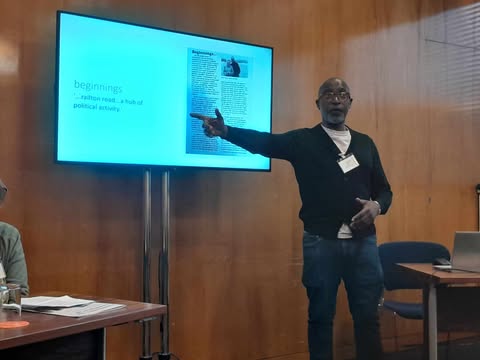The Confederation of Co-operative Housing (CCH) held its annual conference in London last month, with delegates eyeing the opportunities of a government looking to double the UK co-op sector – against a troubling global backdrop of failing housing markets, populist authoritarianism and environmental crisis.
Discussion opened with a look at the overwhelming issue of housing shortages and soaring prices. Jereoen Douglas, director general of the International Cooperative Alliance (ICA), said that with the global population set to hit 10 million by 2050, the world needs to build 1.5 billion new homes, equating to 130,000 a day.
Sourcing the material for this poses serious environmental callenges, he warned – and, with the world at risk of missing its targets to limit climate change, rising temperatures will displace another billion people, with a “huge impact on housing”.
Douglas blamed housing shortages, which are inflating prices and driving inequality, on “very poor policy”– but, he argued, the UK government’s pledge to double the co-op economy offers a potential solution that the rest of the world can take inspiration from.
Globally, the UN’s sustainable development agenda is lagging behind its 2030 targets but the co-op movement is an ideal partner to push things forward, including on housing, said Douglas. “Co-ops are globalisation from below. We can build a globalised model, from the people and with people in the centre of the economy.”
In the UK, that means 9,000 housing co-ops across the country, and Rose Marley, CEO of Co-operatives UK, and David Alcock from Antony Collins Solicitors, both hoped this figure could grow, helped by the forthcoming Law Commission review of the co-op sector and greater clarity on legislation and governance.
Related: UK’s first purpose-built housing co-op celebrates 50 years
Alcock, who is involved in this review process, said efforts to secure this clarity are “really critical” in the context of a global swing to the populist right, with the recent US election victory for Donald Trump and, in the UK, Reform running Labour a close second in a number of constituencies. This means co-ops are increasingly “counter-cultural” and could find themselves operating in a hostile landscape, he warned, which makes it more urgent for the co-op movement to unite and work together.
Working together includes solidarity across generations, said Ana Aguirre, president of the ICA’s Youth Committee. With housing a critical issue for young people, the lack of youth involvement is a problem, she said, warning that the jargon used by the movement poses a barrier to new entrants. “If you challenge me to list the co-operative principles in order, I doubt I could,” she said. “But if you list them to me, I’d have zero doubt that I believe in them.”
This is “the difference between knowing and being”, she argued, and said the co-op values should be discussed in relation to everyday practice. She highlighted the importance of making co-operative principles accessible and relevant to everyday practice.

For housing co-ops, that everyday practice involves issues like conflict resolution, member involvement and consumer standards. The last of these is high on the agenda for registered provider co-ops, with the Social Housing Regulation Act taking force in July 2023.
Kate Dodsworth, from the Social Housing Regulator, said new tenant satisfaction standards mean tenants can compare their landlord against national figures. The data will also help landlords to measure and improve their performance and manage serious issue like health and safety compliance.
Member engagement here is a useful tool, with Karen Williams, from Bushbury Tenant Management Organisation in Wolverhampton. She shared how partnerships and targeted initiatives have supported over 700 families, provided significant community funding and improved community safety.
Accurate and up-to-date property records are also crucial for health, safety, and security compliance, the session heard.
Related: Housing co-op apex CCH helps member secure £40k retrofit grant
With housing shortages a national issue, registered provider co-ops also need to address issues of overcrowding and under-occupancy, said Blase Lambert, CEO of the CCH. Where possible, tenants should be moved to properties of a more suitable size, or properties should be developed to suit tenant numbers – although, “to be frank, in areas very high demand, like Central London, that’s sometimes easier said than done”, he added.
Housing co-ops also need effective complaint-handling procedures, and Kirsty Noakes, from the Housing Ombudsman, encouraged co-op landlords to view this process in a positive light. A complaints process should empower tenants, she said, and give managers the information they need to improve their service. Co-ops should also align their policies with the statutory complaint handling code, she added, and maintaining clear, secure records should be kept.
Complaints procedures can be difficult for housing co-ops, with delegates highlighting the tendency of some tenants to continually air grievances or try to use the process to resolve interpersonal conflicts. The system can also put huge pressure on tenant managers, who can find themselves on demand on a 24/7 basis.
Member engagment offers one way to resolve such tensions. This engagement is a perennial challenge for co-ops – not just in the housing sector – but in Leicester, Belgrave Neighbourhood Co-op has put several successful initiatives in place. Its chair Jaimini Bharakhada said these include involving residents in activities such as parties, gardening and food events, and leveraging volunteers – and also working to integrate non-tenants into activities to drive broader community cohesion.
Open communication and transparency with tenants, is also crcucial, said Melanie Brennan, director of MB Housing, who suggested the use of text messaging services for regular updates.

The conference closed with thoughts on the housing co-op tenant experience. Michael Cadette and Megan Doolittle, from the respective management committees of London’s Brixton and Vine housing co-ops, stressed the ideals of the movement. Both co-ops have their roots in radical social activism and have built communities where tenants enjoy the benefits of affordable rents and secure tenure, they said.
This security gives tenants the freedom to lead creative, fulfilling lives, said Doolittle. “It’s a fabulous place to live, basically. And I just always say to people, and we made it so … We planted the trees, we made the co op.”
And while the pressures of being a tenant-owner can be hard work, the idealism remains. “We are doing something which is counter-cultural,” said Cadette, “which is to work collectively. To work co-operatively is not what’s pushed … but the propensity to despair should not be indulged. Sing yourself up … we have the evidence that this can be done.”

